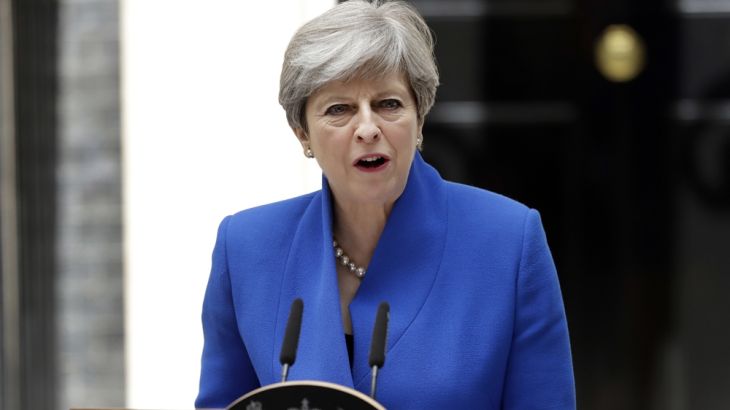
UK election: Brexit plans in disarray
We examine whether Brexit talks are in disarray after Britain’s election throws up a hung parliament.
People living in Britain are waking up to uncertainty as Prime Minister Theresa May ignored calls to stand down after the ruling Conservative Party lost an overall majority in parliament in a general election on Thursday. The early election was meant to strengthen the British Conservative Party’s hand in the lead-up to Brexit negotiations, but it has backfired spectacularly.
I think if we'd had a large Conservative majority like all the polling was pointing to, then Theresa May could've pushed through her version of Brexit.
May had advocated a “hard Brexit” – a withdrawal that includes a clean break from the European Union’s single market and customs union.
Keep reading
list of 4 items‘We need you’: Solomon Islands’ support for US agency’s return revealed
Why are nations racing to buy weapons?
Parallel economy: How Russia is defying the West’s boycott
Her government has already triggered Article 50 of the EU Lisbon treaty which could see Britain formally leave the EU by March 30, 2019. But the uncertainty of a hung parliament has raised concerns about Britain’s ability to negotiate divorce terms by then, that would ensure that people and businesses are not stuck in legal limbo.
Simon French, chief economist at the investment bank and corporate broker Panmure Gordon, believes a “softer” Brexit will be in the works, given the election outcome.
“I think if we’d had a large Conservative majority like all the polling was pointing to, then Theresa May could’ve pushed through her version of Brexit which is outside the single market, outside the customs union with tight control over migration, and not giving much money into the EU pot in terms of paying for access,” explains French.
“Now, of course, if she’s [May] got to be constantly making deals throughout this parliament, or indeed if she falls and there’s a lot of negotiations or a lot of discussion as to whether she’ll be leading this Conservative minority government. Whoever it is, they are going to have to make deals with other political parties, and almost every other political party that has an MP in the new parliament wants a softer version of Brexit,” says French.
French doesn’t think Brexit didn’t really influence the outcome of the election for the Conservatives.
“The success of the Labour Party winning more seats than expected was because they tapped into anxiety over public spending cuts since 2010, anxiety over the state of National Health Service, and also concerns with youth voters over the amount of student debt and access to UK housing – two big issues. It has to be said, young voters under 30 who disproportionately like the policies of Jeremy Corbyn were expected to turn out in quite low numbers and they turned out in droves yesterday and that really has pushed the agenda more in Jeremy Corbyn’s favour and away from the conservatives who really tapped into an older constituency in recent elections,” says French.
Also on this episode of Counting the Cost:
GCC crisis: Qatar says its citizens and residents won’t face economic hardship, despite the sea, air and land embargo imposed by its Gulf neighbours Saudi Arabia, the United Arab Emirates and Bahrain. Abdulaziz al-Horr, CEO of Qatar Finance and Business Academy discusses the latest.
Worldwide pensions: Babies born today can expect to live to beyond 100 in the world’s biggest economies, if current trends in life expectancy continue. Longer life expectancy means people may have to work past the age of 70 in the years to come.
The World Economic Forum is warning that the money saved is far short of what’s needed. It’s predicting that the world’s six largest pension-saving systems – the United States, UK, Japan, Netherlands, Canada and Australia – will have a retirement savings gap of $224 trillion by 2050. Adding China and India, which have the world’s largest populations, the savings gap rises to $400 trillion by 2050. That’s five times the size of the current global economy.
Michael Drexler, head of financial and infrastructure systems at the World Economic Forum, discusses raising the retirement age.
South Africa recession: South Africa has entered recession for the first time in eight years. It’s added pressure on a government facing corruption allegations and credit downgrades. The governing African National Congress under President Jacob Zuma has struggled to bring down unemployment, which is officially at 27.7 percent. And there’s political uncertainty over the financial scandals surrounding Zuma, as Malcolm Webb reports from Johannesburg.
Donald Trump and climate change: US President Donald Trump may have turned his back on climate change, but several American politicians at the state and local level have pledged to tackle global warming. California Governor Jerry Brown has signed agreements with China to work together on reducing emissions and promote green technologies. Brown warned that “disaster still looms” without urgent action.